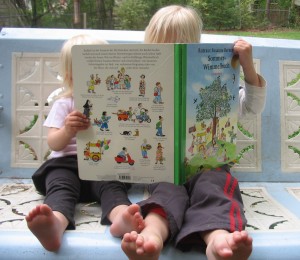 Everyone has their odd little quirks as a parent, the things that you want your children to be interested in because, if you are honest with yourself, you are into them. Some of us sign our kids up for art classes so that they can learn the joy of expressing themselves through wild finger painting. Other parents whisk their children off to mandolin lessons because they always wanted to be bluegrass musicians.
Everyone has their odd little quirks as a parent, the things that you want your children to be interested in because, if you are honest with yourself, you are into them. Some of us sign our kids up for art classes so that they can learn the joy of expressing themselves through wild finger painting. Other parents whisk their children off to mandolin lessons because they always wanted to be bluegrass musicians.
My deep dark longing for my children is for them to learn German. Oh, I know that there are more “useful” second languages for an American child to learn—Spanish may be more practical on a day to day basis and Chinese may serve them better in the emerging economic world, but I love German. German is often dismissed as a guttural, ugly tongue, but I think it is a charming language of its own. I like the order of its grammar, its odd tendency to throw any and all verbs to the end of a sentence, and the mile long nouns that make beautiful sense once you decode them.
To this end, I have been speaking to my children and reading to them in a decidedly non-native accent for years now. My children will humor me by sprinkling their speech with German nouns—Käse, Trinkflasche, Schuhe. Still I think my older child views our German conversations (if you can call it that when only one person does the talking) as an oddity, as a silly pretend language. I can still remember the day when, as an 18 month old, he heard another mother admonishing her son on the playground in German. My son stopped playing, cocked his head, and you could read on his face—“They speak our code, too!”
Fast forward another 18 months, numerous Feuerwehr books, and some amusing German DVDs, and my son started attending his first little German language class. We are interlopers at this class—most of the other children have at least one “actual” German parent, and many will be returning home to Germany once their parents’ tenure in North Carolina is through. My son seems to enjoy these orderly classes—he sings the little welcome song as he pushes his fire trucks around our living room, and he proudly displays the Eisbär that he made that week, but I’m not naïve enough to think that he is truly gaining in fluency. What I hope that he is getting from his classes is what I enjoy about taking him there—forging connections with people. I love listening to the German mamas talk about their children or what they will be doing for the holidays. I love answering their precisely phrased English questions with my own freewheeling German. I like being the “odd man out,” and I want my son to experience that feeling and to welcome it and hopefully someday to seek out that same sensation in other cultures and with other languages and with other people.
